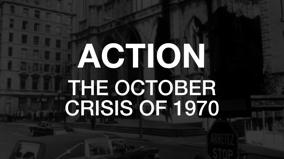New release
Coming
None
A Song for Quebec
1988
55 min
Leaving soon
Produced in 1988, this feature documentary presents a living history of Quebec's last 40 years as seen through the eyes of one couple. Pauline Julien and Gérald Godin, two Quebec artists, share their perspectives on the events that have marked Quebec's evolution. Julien, a singer, and Godin, a poet, express their love and passion for the province (and each other) while providing a unique take on the Quebec nationalist movement.

Details
Produced in 1988, this feature documentary presents a living history of Quebec's last 40 years as seen through the eyes of one couple. Pauline Julien and Gérald Godin, two Quebec artists, share their perspectives on the events that have marked Quebec's evolution. Julien, a singer, and Godin, a poet, express their love and passion for the province (and each other) while providing a unique take on the Quebec nationalist movement.
-
directionDorothy Todd Henaut
-
cinematographyZoe Dirse
-
editingSusan ShanksWerner Nold
-
writerJosh Freed
-
assistant directorDominique Parent
-
researcherDominique Parent
-
subtitlesRobert Gray
-
location soundEsther AugerHans OomesEric Lambert
-
gafferClermont Lapointe
-
assistant cameraRené DaigleSimon LeblancDawn NicholPatrick Duroux
-
location managerAlain LabrosseMaryvonne Querre
-
assistant editorMonique Gervais
-
historical watercoloursGeorge Geertsen
-
narrationAnne Henderson
-
sound editingWojtek Klis
-
assistant sound editorAndré ChaputPat Gyorfi
-
foley artistLise Wedlock
-
narration recordingNathalie Fleurant
-
re-recordingJean-Pierre JoutelAdrian Croll
-
video post-productionRichard LesagePhillipe VandettePierre BélangerBarbara Hutchinson
-
production accountantNanci Tastello
-
post-production coordinatorGrace Avrith
-
unit administratorRob SpenceRose Hutchinson
-
associate producerSvetlana ZylinSusan Shanks
-
co-producerDorothy Todd Henaut
-
senior producerAdam Symansky
-
series producerDavid Grubin
-
executive producerBill Nemtin
















